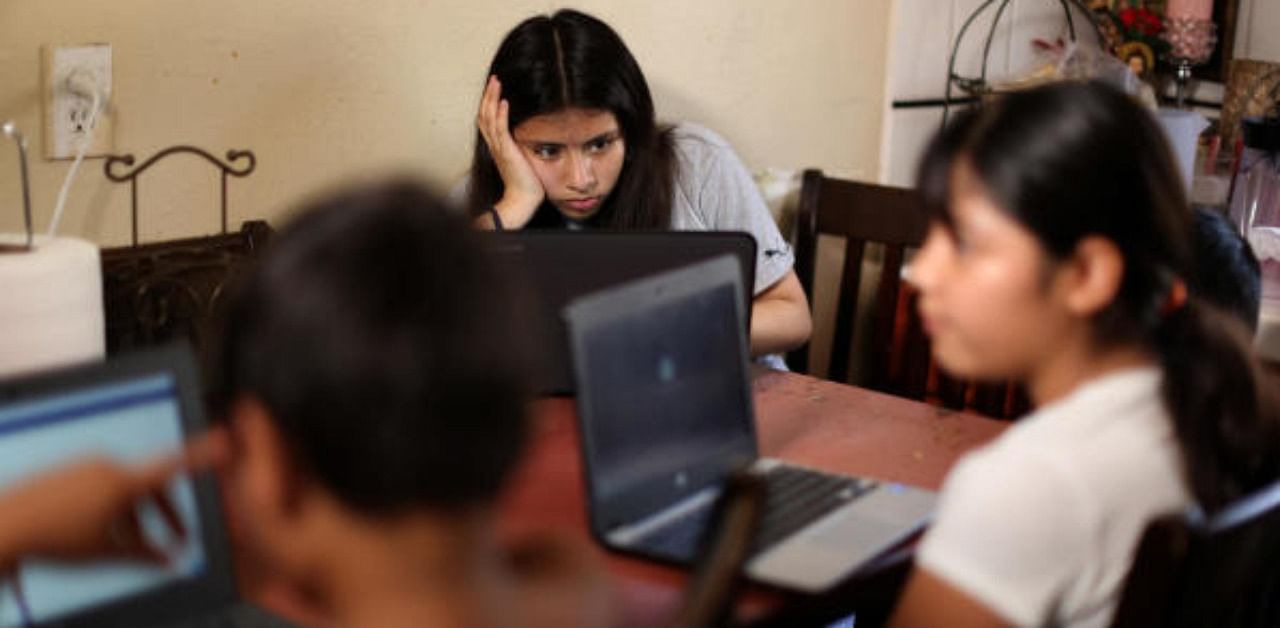
As more universities abandon plans to reopen and decide instead to keep classes online this fall, it's leading to conflict between students who say they deserve tuition discounts and college leaders who insist remote learning is worth the full cost.
Disputes are flaring both at colleges that announced weeks ago they would stick with virtual instruction and at those that only recently lost hope of reopening their campuses. Among the latest schools facing pressure to lower tuition are Michigan State University and Ithaca College, which scrapped plans to reopen after seeing other colleges struggle to contain coronavirus outbreaks.
The scourge has killed more than 1,75,000 people in the United States. Worldwide, the confirmed death toll crossed 8,00,000 on Saturday, according to a tally kept by Johns Hopkins University, and cases passed 23 million.
In petitions started at dozens of universities, students arguing for reduced tuition say online classes fail to deliver the same experience they get on campus. Video lectures are stilted and awkward, they say, and there's little personal connection with professors or classmates.
Many schools, however, respond that they have improved online classes since the spring. Some have instituted decreases of 10 percent or more, but many are holding firm on price.
At Michigan State, senior Tyler Weisner said the online classes he took last spring were less effective than what he gets on campus. Weisner, who started a petition to reduce tuition, said he's also missing out on many of the benefits of college.
“You're paying that price tag because colleges bring students from all over the country together, to experience different cultures,” he said. “People don't just choose strictly off education or the professor. They want a nice place to live and a new experience.”
Similar petitions have been started at schools from Rutgers University in New Jersey to the University of Southern California. Plans to continue virtual instruction this fall are further angering many students who were frustrated by the experience of studying online last spring, when colleges across the US abruptly sent students home as the pandemic intensified.
In the wake of that, students at more than 100 colleges filed lawsuits demanding partial refunds.
It also renews a wider debate about the cost and value of a college degree. After years of increases, many students said they could barely afford tuition before the pandemic. Now, as families around the country struggle, many say there's a new need to rein in costs.
Some colleges lowered tuition as they moved classes online, often acknowledging families' hardships and the differences in online classes. Several universities in Washington, DC, lowered prices by 10 percent, including Georgetown University.
Princeton University also cut tuition by 10 percent. In Massachusetts, Williams College announced a 15 percent discount after moving to a mix of online and in-person classes. Others, however, have refused. Harvard University is charging full tuition, about $50,000 per year, even though all undergraduate classes will be online this fall. The Ivy League school invited freshmen to live on campus while taking classes online, but about 20 percent have deferred enrollment, the university announced.
Many colleges had hoped to bring students back, with major modifications. But after outbreaks at many of the first campuses to reopen — often tied to off-campus parties — some are retreating from their plans.
The University of North Carolina at Chapel Hill halted in-person instruction this past week after 130 students tested positive for the virus. The university is letting students cancel their housing contracts without penalty, and it's reimbursing students for their meal plans, officials said.
But students will still be on the hook for hundreds of dollars in fees that aren't likely to benefit them, including $279 for athletics, $400 for student health, more than $200 for campus transit and $160 for student union centre operations.
“I think it's ridiculous,” said Mackenzie Holland, a freshman who left UNC on Tuesday. “All of those funds go to things that are specifically on campus, and I can't utilize any of those things.” At Michigan State, officials said they have no plans to lower tuition.
They said other schools are cutting costs by leaning on part-time faculty or student assistants. Instead, Michigan State said it has invested in technology and faculty training to improve remote instruction.
"Regardless of the format of instruction, MSU is delivering what students pay for: courses taught by high qualified and world-class faculty, tutoring services, office hours, academic advising and access to our libraries," spokeswoman Emily Guerrant said.
Michigan State said the decision to keep classes online will cost the school millions in lost housing revenue. Ithaca College, which is not cutting tuition, said it's also taking a financial hit by telling students to stay home this fall.
“Room and board is a significant piece of our revenue for the year, but this decision was really driven by putting the health and safety of our students first,” said Laurie Koehler, vice president for marketing and enrollment strategy at Ithaca.